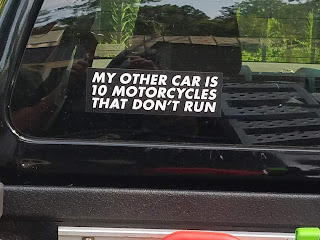Long-Term Costs of Motorcycle Ownership
Over the summer, I went to Cars and Coffee at Katie's in Great Falls, Virginia, and while there, a gentleman in a 'resale red' Ferarri 550 Maranello was parked near me. This is one of my favorite cars of all time, with a fantastic sounding V-12 in front of the passengers and a shape to die for. It's one of the ultimate Ferrari grand tourers. Making a mental note to see how much these cost on cars.com when I got home (a man can dream), I jumped on my motorcycle and left Katie's.
A check in my mirror revealed a Ferrari behind me right about the time my low fuel light came on. I've run out of gas enough times over the years that when I see that amber glow, I'm a man obsessed, looking for the first purveyor of fuel I can find. I pulled into the nearby Sunoco, and lo and behold, the 550 Maranello from Katie's pulled into the adjacent fuel island. I'm biased, but I love when my little Ducati is parked next to Italy's finest automobiles, and being from the midwest, I felt perfectly within my rights to start up a conversation.
We talked about Katie's and quickly arrived at the secret handshake that while we have the privilege of owning some unique iron, we also have limited budgets and can't just trailer our vehicles off for pampered, very expensive maintenance every time something goes wrong. We talked about the spreadsheets we keep to track costs, and had a good laugh because we had both recently arrived at the point where the maintenance receipts exceeded the purchase price of the vehicle. Mind you, our costs were a full order of magnitude apart, but the effect is the same. We think to ourselves, holy crap, I've put some serious cash into this thing, and that's to simply keep it alive! Like the free puppy, the purchase price is just the ticket to entry. Keep or sell? Keep or sell? What to do for the next one? Keep for a couple of years, then get rid of it before a major service is due?
The bottom line for me (and my new Ferrari-owning acquaintance) is that at some point, the vehicle cost became immaterial. I get so much enjoyment out of it that it's worth using it regularly, keeping it in good repair, and riding with the intent of wearing it out. Being a pragmatist, one can get a new vehicle and transfer these costs from repair (of the old vehicle) to depreciation (of the new), but it's a wash. The only real savings come from getting the depreciating asset off the books completely or simply stop driving it and letting it sit as a speculative investment. Thanks, but no thanks!
What I will say, though, is those costs are there whether the vehicle is driven or not. A friend of mine with a classic car recently had an eye-watering five-digit repair bill to make their car roadworthy after sitting in the garage for years. Your results may vary, but machinery generally does not do well sitting idle. Hoses rot, tires flat-spot, seals dry out, etc. In my opinion, it's better to go the carpe diem route and run it into the ground.
Depending on your personality, you may own vehicles for decades, or just a couple of years. You may keep meticulous records, or you may spend 3 hours trying to dig up the title from the bottom of your junk drawer. The yearly costs I have here represent a handful of motorcycles I've owned over the last ten years. On average, all were ridden about three thousand miles per year.
Exhibit A: 1998 Kawasaki Vulcan 500. Ultra-easy maintenance and mechanically simple
Year
|
Oil Change
|
Fluid Flush
|
Tires
|
Major Maintenance
|
Unplanned Repairs
|
Total
| |
2010
|
$290
|
$45
|
$50
|
$0
|
$45
|
$20
|
$450
|
Exhibit B: 2007 Ducati GT1000. Cheap by Ducati standards, but still painful every 7,500 miles
Year
|
Insurance / Registration
|
Oil Change
|
Fluid Flush
|
Tires
|
Major Maintenance
|
Unplanned Repairs
|
Total
|
2011
|
$310
|
$70
|
$0
|
$538
|
$0
|
$0
|
$918
|
2012
|
$310
|
$70
|
$25
|
$0
|
$0
|
$170
|
$575
|
2013
|
$310
|
$70
|
$0
|
$520
|
$1,100
|
$0
|
$2,000
|
2014
|
$310
|
$70
|
$25
|
$286
|
$182
|
$0
|
$873
|
2015
|
$310
|
$70
|
$0
|
$0
|
$0
|
$0
|
$380
|
2016
|
$310
|
$70
|
$25
|
$0
|
$1,064
|
$0
|
$1,469
|
2017
|
$310
|
$70
|
$0
|
$282
|
$0
|
$140
|
$802
|
2018
|
$310
|
$80
|
$25
|
$200
|
$0
|
$155
|
$770
|
2019
|
$310
|
$80
|
$0
|
$250
|
$2,500
|
$115
|
$3,255
|
Exhibit C: 2009 Yamaha FJR1300. Major maintenance 'only' every 16,000 miles, but of course, I just hit that.
Year
|
Insurance / Registration
|
Oil Change
|
Fluid Flush
|
Tires
|
Major Maintenance
|
Unplanned Repairs
|
Total
|
2017
|
$310
|
$60
|
$100
|
$500
|
$0
|
$500
|
$1,570
|
2018
|
$310
|
$0
|
$0
|
$0
|
$0
|
$0
|
$310
|
2019
|
$310
|
$60
|
$130
|
$0
|
$1,100
|
$270
|
$1,870
|
On average, I'm putting about fifteen-hundred dollars per year into riding, not including gas and the occasional new helmet, boots, etc. Not cheap, but probably comparable to someone with a golf or i-gadget habit. In motorcycle terms, I'd say this is on-par with Harley, and probably half what I'd expect to pay in maintenance for a tire-eating, fire-breathing dragon like an Aprilia Tuono or a Panigale.
If I learned anything from my data, it's this:
- If you're on a budget, go naked Japanese. Longer service intervals, low-cost parts, and you can do most work yourself. If you go shaft drive, your maintenance is even easier. If you're really on a budget, go air-cooled single or two-cylinder for maximum simplicity.
- Every bike needs registration, insurance, tires, and yearly oil changes. This instantly throws a few hundred bucks a year into your budget whether you ride zero miles or fifteen thousand.
- Sorry to you under-25ers- insurance is a killer, possibly 4x what I have here, and worse still if you have a lien on the bike and need full coverage. This is the one area where being mature and riding safely saves a ton of money.
- If you can perform the basics yourself, you can realize some substantial savings. This really comes into play with valve adjustments, coolant flushes, etc.
- Buying a low mileage, three-year-old motorcycle takes away the big depreciation hit, but you run headlong into maintenance and need to plan for it.
- Know the service intervals prior to purchase and if the current owner is not up to date, absolutely work this into your negotiation. If not, you could be thousands in the hole before you've registered the bike in your name!
- The absolute best motorcycle I owned from a financial standpoint was my starter bike. Fully depreciated, sold it for what I paid, rode it five thousand miles, and maintenance was an absolute breeze. If you're on a budget, simpler is better. If you go Harley or European, there's no such thing as a bargain if you can't do the maintenance yourself.
If you're interested in getting into motorcycling or simply trying to figure out how much that two-wheeled conveyance you never ride is sucking from your wallet, I hope this provides a useful baseline. Ride happy!




Comments
Post a Comment